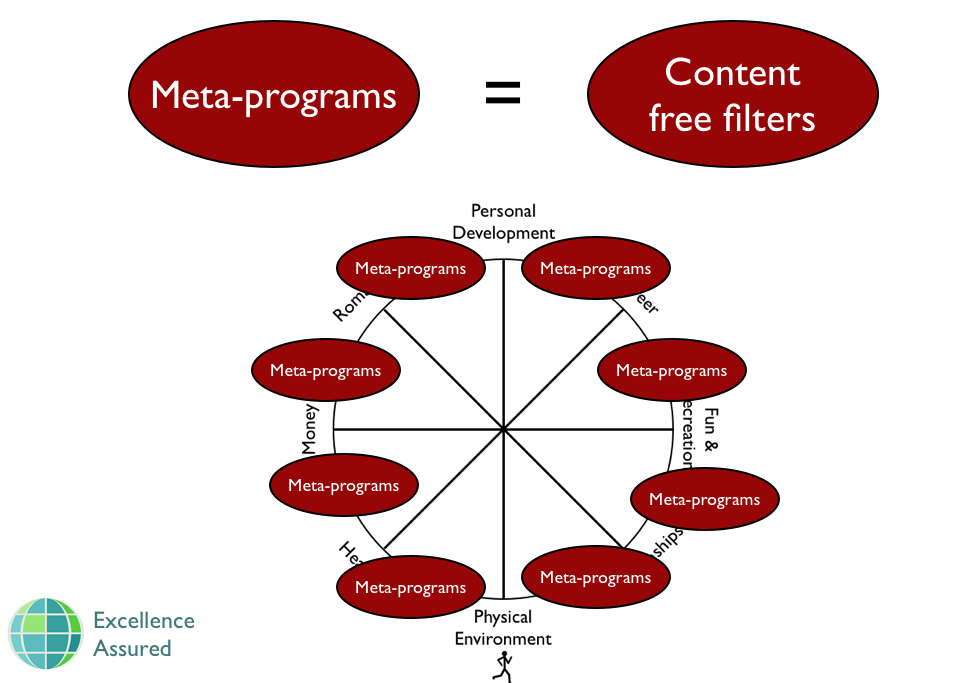NLP Metaprograms (or Meta-programs, or Metaprogrammes) are one of the keys to the way a person processes information, which is why they are important. They are internal patterns that help determine how we form our internal representations and direct our behaviours, the internal programs we use in deciding what we pay attention to. NLP Metaprograms dictate unconscious processes.
Meta-programs and values form a major part of our NLP Master Practitioner Training.
They are detailed and perfectly interpreted in Tad James – Timeline Therapy And The Basis of Personality.
External behaviour – Introvert/Extrovert
The question to elicit this meta-program is – “When it’s time to recharge your batteries, do you prefer to be alone or with people?”
Uses – In business – recruitment – to suit the role. In therapy – to help couples understand how they re-energise most effectively.
Internal Processes – Intuitor/Sensor
Question “If you were going to study a certain subject, would you be more interested solely in the facts and their application for the now, or would you be more interested in the ideas and relationships between the facts and their application for the future?”
Uses – Therapy – to enable people to communicate more effectively, at the same chunk level. Business – In recruitment to ensure that you get the right personality for the role, help future retention levels.
Internal State – Thinker/Feeler
Question – “When you make a decision do you rely more on impersonal reason and logic, or more on personal values?”
Uses – Business – to align board members to company values. Therapy – to help people to deal with resistance to past events and move on.
Adaptive Response – Judger/Perceiver
Question “If we were going to do a project together, would you prefer that it were outlined, planned and orderly or would you prefer that we were able to be more flexible in the project?”
Uses – Business – to enable you to manage someone more effectively. Therapy – To aid couple in understanding others actions.
Direction Filter – Toward/Away From
Question “What do you want in a job?”
Uses – Business – to set effective bonus/disciplinary schemes in managing people. Therapy – to enable better goal setting
Reason (or modal operator) Filter – Possibility/Necessity
Question “Why did you choose your present job?”
Uses – Business – Again helps to enable manager to manage to persons stengths, build rapport. Therapy – To relieve stress
Frame Of Reference Filter
Question “How do you know when you have done a good job? Do you just know inside, or does someone have to tell you?”
Uses – Business – Help managers know how often praise may be required. Education – to judge whether a person is learning appropriately.
Action Filter
Question “When you come into a situation, do you usually act quickly after sizing it up or do you do a detailed study of all the consequences and then act?”
Uses – Business – Helps in recruiting in sales. Therapy – Possibly can help people to move from Effect to Cause.
Affiliation Filter
Question “Tell me about a work situation (or environment) in which you were the happiest, a one time event.”
Uses – Business – Helps with tasking. Business – Helps identify management potential.
Primary Interest Filter – People, place, things, activity, information.
Question – “Tell me about your favourite restaurant. Tell me about one of the top ten experiences in your life.”
Uses – Business – For Recruitment again. Business – Managing people to ensure boredom thresholds are not reached, helps retention.
NLP Metaprograms and Strategies
Metaprograms determine how we do our strategies. Meta-programs are one way a person processes information, strategies are another. Meta-programs determine how we form our internal representations, strategies are the sequencing of the internal representations in order to get an end state.
Read more about NLP Metaprograms

